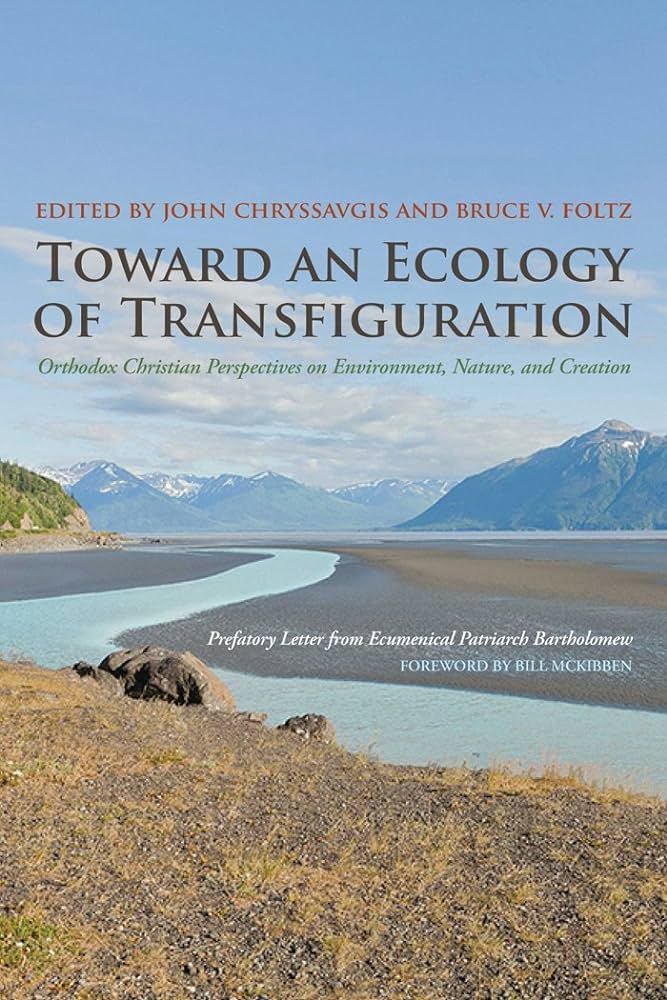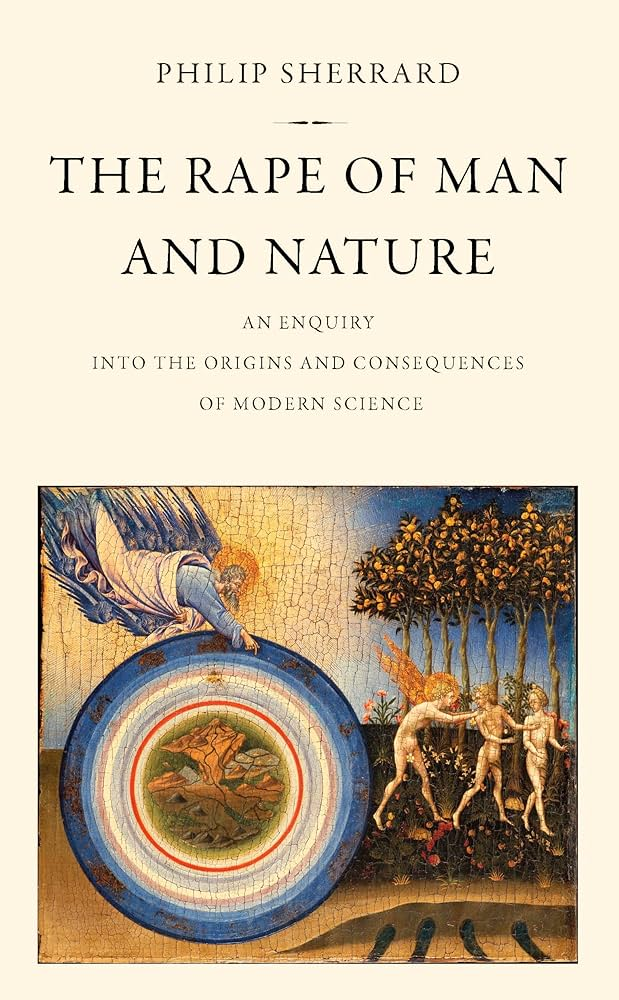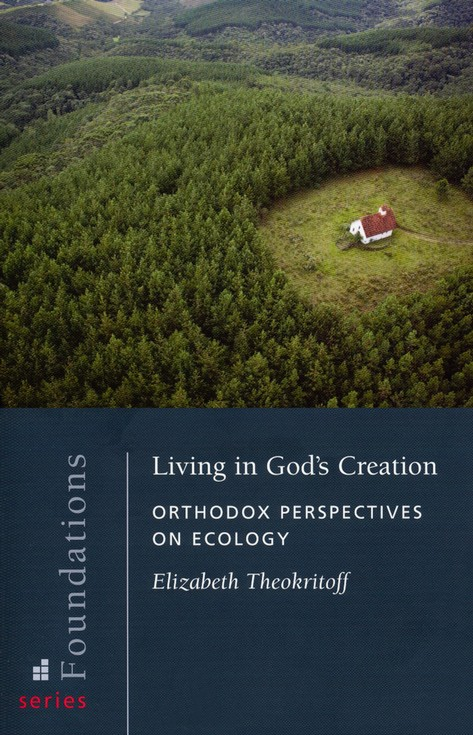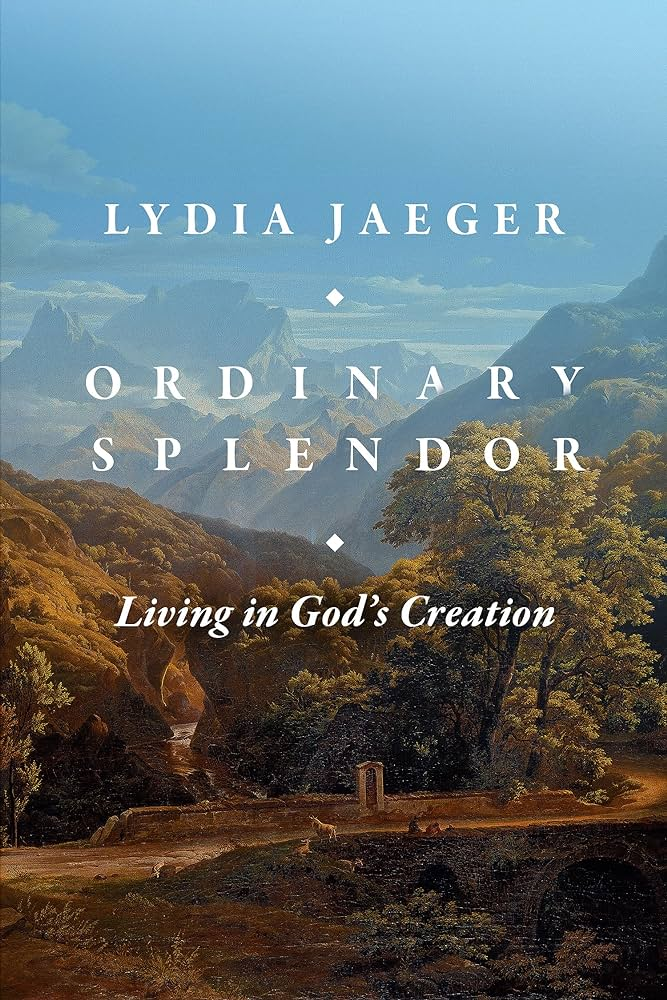Living in God’s Creation
The “message is quite clear,” writes Philip Sherrard, one of the key translators of the Philokalia, “our entire way of life is humanly and environmentally suicidal, and unless we change it radically there is no way in which we can avoid cosmic catastrophe.” Sherrard goes on to say that the coming “crisis itself is not first of all an ecological crisis. It is not first of all a crisis concerning our environment. It is first of all a crisis concerning the way we think. We are treating our planet in an inhuman, god-forsaken manner because we see things in an inhuman, god-forsaken way. And we see things in this way because that is basically how we see ourselves.”
This arresting quote comes from a collected volume, edited by John Chryssavgis and Bruce V. Foltz, Toward an Ecology of Transfiguration: Orthodox Christian Perspectives on Environment, Nature, and Creation (2013).
I want to devote this post to several important essays in this volume. Another great volume on the topic is Elizabeth Theokritoff’s Living in God’s Creation: Orthodox Perspectives on Ecology (2009). I will also highlight key themes from this book here.
But today I want to focus primarily on a recent favorite of mine, Lydia Jaeger’s Ordinary Splendor: Living in God’s Creation (2023), which is a remarkably beautiful book.
Jaeger is a renowned philosopher and theologian, known especially for her work on the intersection of science and religion. She holds degrees in both physics and theology, and has been a prominent voice in discussions about the compatibility of scientific inquiry and Christian faith.
Jaeger serves as the Academic Dean at the Institut Biblique de Nogent-sur-Marne, a theological seminary in France. Through her scholarly work, Jaeger aims to demonstrate that scientific and religious worldviews are not mutually exclusive but can be harmoniously integrated, enriching both domains of thought.
Jaeger’s work can be compared to other theological explorations of Genesis, such as John Walton’s The Lost World of Genesis One and Walter Brueggemann’s Genesis. While Walton focuses on the functional ontology of Genesis 1 and Brueggemann offers a socio-political reading, Jaeger’s approach emphasizes the theological and ethical implications of the creation narrative.
In Ordinary Splendor, Jaeger begins by discussing the uniqueness of the biblical creation narrative, highlighting how it presents God as the absolute origin of everything. The implications of this belief are clear. “In the beginning, God created the heavens and the earth.” This statement sets the stage for understanding God as the sovereign creator who brings everything into being without any pre-existing materials. Jaeger contrasts this with ancient and modern misconceptions that fail to distinguish clearly between God and the world. The biblical perspective stands in stark contrast to the polytheistic views prevalent at the time of Genesis’s writing. She refers to the Babylonian creation story, Enuma Elish, to illustrate how the Bible’s monotheistic creation narrative diverges radically from the cosmogonies of other cultures.
Indeed, Jaeger emphasizes that the biblical account demythologizes the world, making it amenable to scientific exploration, as creation is an ordered system that humans can study and understand. This demythologizing also prevents the world from being given quasi-divine status, a tendency seen in both ancient mythologies and modern scientific overreach.
The implications of the biblical creation theology for human existence and worship are profound. Jaeger argues that recognizing God as the creator leads to a life centered on prayer and worship, directed towards the Creator who is the origin of all things. This theological framework prohibits idolatry, whether it be the worship of physical idols or the elevation of any created thing to ultimate importance.
Furthermore, Jaeger addresses the fallacy of living without acknowledgment of God. She contends that even those who claim to be atheists owe their existence to the Creator. Human life, according to Jaeger, only finds its true meaning when we acknowledge our dependence on God. This acknowledgment transforms our understanding of reality, leading to a life of gratitude, worship, and service to the Creator.
Jaeger then goes on to argue that existence, as such, is a gift. Creation is an act of divine generosity. She contrasts the biblical view with the existentialist perspectives that reject the notion of a divine origin. She focuses particularly on the ideas presented by Jean-Paul Sartre in his novel Nausea. For Sartre existence is contingent and thus devoid of inherent necessity. It is simply a “brute fact.” This of course leads to the sense that existence is superfluous, which becomes overwhelming and repulsive. Sartre’s character, Antoine Roquentin, epitomizes this existential dread, experiencing the world as a series of gratuitous events without any underlying purpose or origin.
By contrast, according to Jaeger, the theological perspective sees existence as a gift from God. She invokes the metaphysical framework of actuality and potentiality, used in medieval theology to describe the nature of beings and their dependence on a necessary, uncaused cause—God. In this view, all contingent beings (i.e., everything in creation) derive their existence from God, who is pure actuality and the source of all potentiality .
Jaeger argues that recognizing existence as a gift leads to a life of gratitude and purpose. This theistic view provides a foundation for seeing the world and life itself as meaningful and directed. By accepting our contingent existence as a gift from the Creator, humans can find a profound sense of value and purpose in life, contrasting sharply with the absurdity and meaninglessness of existence as portrayed by existentialist thought.
In the next chapter Jaeger expands on the concept of living within a created order. She affirms that creation is not merely a random arrangement but is imbued with purpose and meaning. This order reflects the wisdom and sovereignty of God. She emphasizes that acknowledging and respecting this order is fundamental to living a life in harmony with the divine plan.
A key aspect of this chapter is the discussion on technology and its impact on our relationship with the natural order. Jaeger recognizes that technological advancements have allowed humanity to exercise a degree of “dominion” over nature, as suggested in Genesis (see also my discussion here). However, she cautions against crossing the line from stewardship to outright rebellion. This rebellion is marked by attempts to completely control or alter the natural world, ignoring the inherent value and purpose imbued in it by the Creator.
Jaeger then discusses how totalitarian regimes, driven by the desire to reshape humanity and society according to their ideologies, exemplify extreme forms of rebellion against the created order. These regimes’ efforts to impose a new, arbitrary order, detached from the natural structures, often lead to catastrophic consequences, highlighting the dangers of such hubris.
Furthermore, Jaeger continues to contrast the biblical view with existentialist perspectives, particularly those of Sartre, who saw the world as devoid of inherent meaning and form. Sartre’s depiction of a world without origin or obligation starkly contrasts with the biblical view of a created, ordered universe, which demands a response of gratitude and obedience from humanity.
Another significant theme is the human pursuit of knowledge. Jaeger explores the mystery of why the human mind is capable of understanding the world. She points out that scientific inquiry often operates under the assumption that the world is intelligible and that human beings can uncover its laws and principles. This assumption, she argues, is deeply rooted in the belief in a rational Creator who made the universe comprehensible.
Finally, Jaeger also addresses the ecological crisis, linking it to humanity’s neglect or rejection of the created order. She suggests that the environmental challenges we face are, in part, a consequence of failing to respect the delicate balance and rhythms established by God. This neglect is not morally neutral but is a form of rebellion against the Creator’s design.
This naturally leads Jaeger to offer a theological basis for human dignity, and this chapter is particularly remarkable. All human dignity, she argues, is fundamentally rooted in the biblical creation accounts. According to Genesis 1, all humans are created in the image of God (Imago Dei), which bestows an inherent and equal dignity upon every individual. This theological foundation challenges and subverts the ancient Near Eastern practice where only rulers or elites were seen as divine representatives. In stark contrast, Genesis democratizes this divine representation, extending it to all humanity, thus laying a groundwork for equality and universal respect.
The assertion that all humans are made in the image of God carries profound implications for social justice and human rights. Jaeger emphasizes that this scriptural truth combats all forms of discrimination—be it social, racial, or gender-based. By grounding human dignity in the divine image, she argues for an inherent worth that demands respect and equitable treatment for all people. This theological view is revolutionary as it positions every person, regardless of status, as worthy of honor and ethical consideration.
Human dignity, according to Jaeger, also entails a moral responsibility. The Genesis narrative presents humans as not only bearers of God’s image but also as recipients of His commandments. This moral dimension is crucial; it means that dignity is coupled with ethical obligations towards God, each other, and creation. This responsibility manifests in the stewardship of the earth and the cultivation of the natural world, reflecting a partnership with the Creator.
Jaeger critiques contemporary secular views that often struggle to ground human dignity in a coherent and compelling manner. Without the theological underpinning, she argues, secular humanism fails to provide a robust basis for human worth that transcends utilitarian or functionalist considerations. By contrast, the biblical doctrine of creation offers a more profound and enduring foundation for understanding and upholding human dignity.
Jaeger aligns closely with traditional Christian anthropology as articulated by theologians like John Calvin and contemporary thinkers like Kevin Vanhoozer. However, her work also engages critically with modern philosophical ideas, such as those of Immanuel Kant, who posited that human understanding imposes order on an otherwise formless reality. Jaeger counters this by affirming that order and intelligibility are intrinsic to the created world, established by God and discoverable by human reason.
In the next two chapters Jaeger bridges the theological concepts of blessing and obedience with their practical outworking in everyday life. She argues that the act of procreation is a direct participation in God’s creative work. She highlights the miracle of conception and the unique individuality of each new life. Furthermore, Jaeger expands on the practical implications of understanding children as blessings. She suggests that this perspective should influence societal and familial attitudes towards children, viewing them not merely as responsibilities but as precious gifts. Jaeger also touches on the broader implications of God’s blessings in other areas of life, such as work and community. She emphasizes that recognizing God’s hand in these aspects leads to a more profound sense of gratitude and stewardship.
Jaeger then transitions from the reception of blessings to the active response of obedience to God’s commandments. She underscores the importance of understanding that God’s commandments are not arbitrary rules but guidelines designed for human flourishing. She suggests that obedience to these commandments is a way of aligning oneself with the order and purpose of creation. This alignment leads to a harmonious and fulfilling life, as envisioned in the biblical narrative. One key aspect Jaeger discusses is the enjoyment of the goodness of creation. She argues that God’s commandments include an invitation to enjoy His creation responsibly. This involves a balanced approach to life’s pleasures, avoiding both asceticism and hedonism. The challenge lies in maintaining this balance and living out the fear of the Lord in contemporary contexts, which Jaeger acknowledges can be difficult but is ultimately rewarding.
Building on obedience, Jaeger goes on to argue that we must accept our limitations. She argues that recognizing and embracing our limitations is essential for developing a healthy relationship with ourselves, others, and the world around us. She begins by addressing the misconception that restrictions in life are inherently negative. Instead, she argues that recognizing and embracing our limits allows us to live more fully and authentically.
Jaeger draws on the thoughts of the Jesuit theologian Hans Urs von Balthasar to illustrate that true knowledge and experience often come from embracing constraints. For instance, she cites the example of a monogamous marriage, where deep and genuine love is cultivated through commitment rather than through an endless pursuit of diverse experiences. She also references thinkers such as Socrates and Aristotle, who emphasized the importance of self-awareness and the recognition of one’s limits as foundational to wisdom and ethical living.
The chapter also integrates theological perspectives, particularly from Christian thought. Jaeger highlights how the Bible and Christian theology view human limitations not as a curse but as a natural and necessary aspect of creation. She draws on the concept of humans being created in the image of God, yet finite, to argue for a balanced view of human potential and constraints. Practically speaking, she discusses how this acceptance can lead to greater contentment, reduced anxiety, and more realistic goal-setting.
Jaeger’s critique of contemporary culture’s resistance to limits is compelling, as it highlights a significant issue in modern society: the endless pursuit of more at the expense of depth and quality in life. She critiques modern Western society’s tendency to resist limits, exemplified by the metaphor of channel-hopping with a remote control. This behavior reflects a broader cultural trend of avoiding deep commitments in favor of superficial engagements. Jaeger suggests that this restlessness and inability to commit is a form of rebelling against our finite nature.
Jaeger extends this discussion by emphasizing the significance of our embodied existence. Our bodies, with all their specific characteristics, anchor us in particular contexts and relationships. This embodiment is a reminder of our finite nature and should be seen as a source of gratitude rather than regret.
This embodiment also includes our personal history, culture, and character. The biblical creation narrative highlights the significance of being created as male and female, which symbolizes the broader finitude and individuality of human beings. This differentiation serves as a reminder of our limited perspective and our created nature. The narrative posits that human finitude is not an imperfection but a part of God’s good creation. Accepting our limits is essential for recognizing our unique role and serving God within the framework of our individual existence. By acknowledging our created status, we can joyfully accept our limitations as opportunities for God to bless us and for us to serve Him. This acceptance contrasts with the modern desire to live multiple lives or experience everything possible within a single lifetime.
Jaeger emphasizes that not all limitations are created by God; some are the result of sin, such as those imposed by disease or social injustices. However, she asserts that the proper response is not to revolt against finitude itself but to recognize and address the sinful distortions while accepting the fundamental limits of human existence. The challenge lies in distinguishing between these types of limits. Jaeger argues that faithfulness in commitments, such as marriage, brings deeper understanding and fulfillment than a life spent chasing varied experiences. The cultural tendency to avoid commitments reflects a broader resistance to human finitude.
Ultimately, recognizing our limits points us to our dependence on God as our Creator. This dependence is not a constraint but a source of liberation and purpose, allowing us to live fully within the scope of our created nature.
TO BE CONTINUED…



